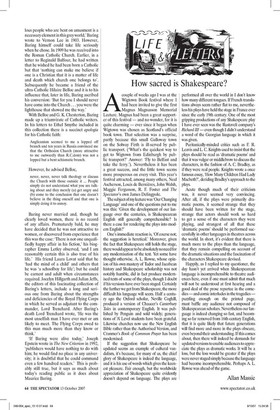How sacred is Shakespeare?
Acouple of weeks ago I was at the Wigtown Book festival where I had been invited to give the first Magnus Magnusson Memorial Lecture. Magnus had been a great supporter of this festival — and no wonder, for it is quite charming — ever since it began when Wigtown was chosen as Scotland's official book town. That selection was a surprise, partly because this small Galloway town on the Solway Firth is ill-served by public transport. ('What's the quickest way to get to Wigtown from Edinburgh by public transport?' Answer: 'Fly to Belfast and take the ferry.'). Nevertheless it has been a great success, and the little town seems more prosperous on every visit. This year's festival attracted, among many others, Neal Ascherson, Louis de Bernieres, John Walsh, Maggie Fergusson, R. E Foster and The Spectator's own James Delingpole.
The subject of my lecture was 'Our Changing Language' and one of the questions put to me was this: 'Given the development of our language over the centuries, is Shakespearean English still generally comprehensible? Is there a case for rendering the plays into modern English?'
One's immediate reaction is, 'Of course not; the suggestion is heretical.' Moreover, given the fact that Shakespeare still holds the stage, there would appear to be absolutely no need for any modernisation of the text. Yet some have thought otherwise. A. L. Rowse, whose opinion of his own mastery of Tudor and Jacobean history and Shakespeare scholarship was not notably humble, did in fact produce modernised texts of some of the plays, though I doubt if his versions have ever been staged. Certainly the further we get from Shakespeare, the more difficult his language will seem. Half a century ago the Oxford scholar, Neville Coghill, produced a version of Chaucer's Canterbury Tales in contemporary English. It was published by Penguin and sold widely; generations of 'A Level students have been grateful. Likewise churches now use the New English Bible rather than the Authorised Version, and Cranmer's Book of Common Prayer has been modernised.
If the suggestion that Shakespeare be updated seems an example of cultural vandalism, it's because, for many of us, the chief glory of Shakespeare is indeed the language, and it is his use of words which gives the keenest pleasure. Fair enough, but the worldwide appreciation of Shakespeare quite evidently doesn't depend on language. The plays are performed all over the world in I don't know how many different tongues. If French translations always seem rather flat to me, nevertheless his plays have held the stage in France ever since the early 19th century. One of the most gripping productions of any Shakespeare play I have ever seen was the Rustaveli company's Richard III — even though I didn't understand a word of the Georgian language in which it was given.
Puritanically-minded critics such as E R. Leavis and L. C. Knights used to insist that the plays should be read as 'dramatic poems' and that it was vulgar or middlebrow to discuss the characters, in the fashion of A. C. Bradley, as if they were real people. Knights wrote a once famous essay, 'How Many Children Had Lady Macbeth?', deriding Bradley's approach to the plays.
Acute though much of their criticism was, it never seemed very convincing. After all, if the plays were primarily dramatic poems, it seemed strange that they should have been written for the stage, strange that actors should work so hard to get a sense of the characters they were playing, and strangest of all that these 'dramatic poems' should be performed successfully in other languages in theatres across the world. In short, it's evident that there is much more to the plays than the language, that they remain compelling on account of the dramatic situations and the fascination of the characters Shakespeare devised.
Happily, as I replied to my questioner, the day hasn't yet arrived when Shakespearean language is incomprehensible to theatre audiences here, even if one must admit that much will not be understood at first hearing and a good deal of the prose repartee in the comedies — and comic interludes in the tragedies — puMing enough on the printed page, must baffle any audience not composed of Shakespearean scholars. Nevertheless our language is indeed changing so fast, and becoming so far removed from 16th-century English, that it is quite likely that future generations will find more and more in the plays obscure, even beyond their understanding. If this comes about, then there will indeed be demands for updatedversions to enable audiences to appreciate the plays as dramatic works. It will be a loss, but the loss would be greater if the plays were never staged simply because the language had become incomprehensible. Perhaps A. L. Rowse was ahead of the game.



































































 Previous page
Previous page